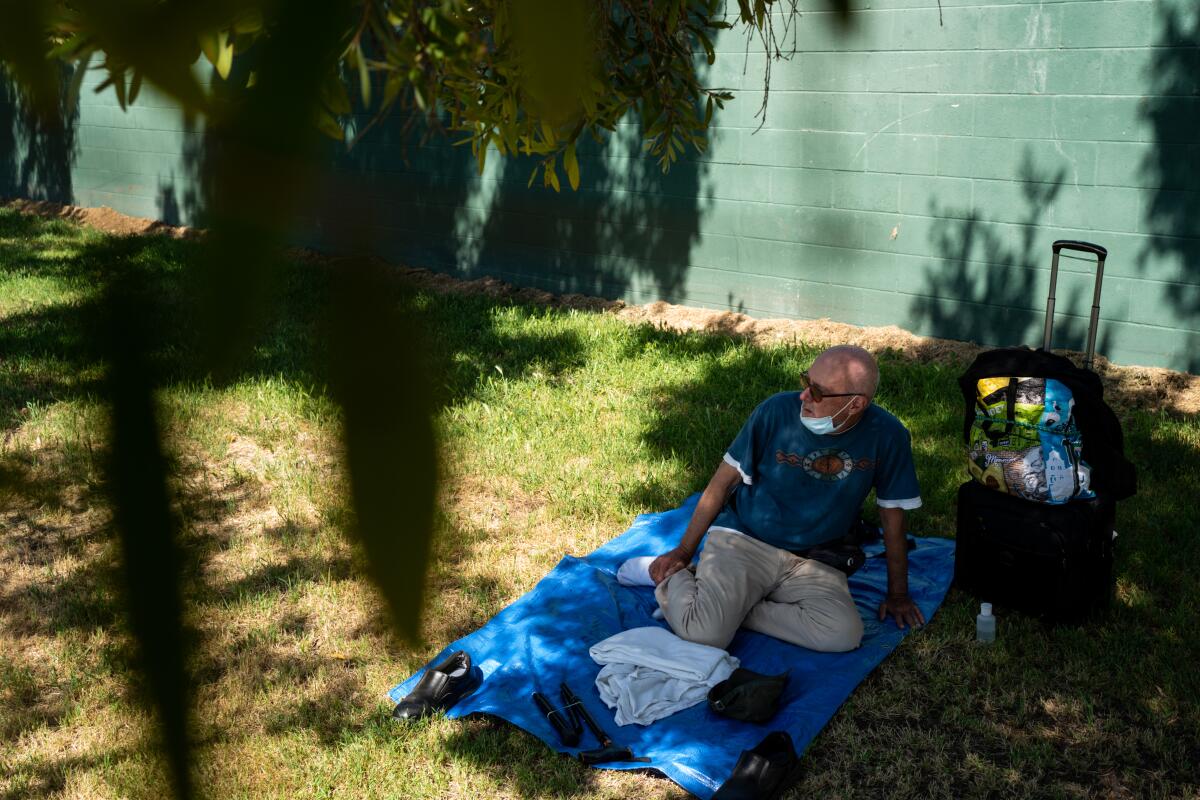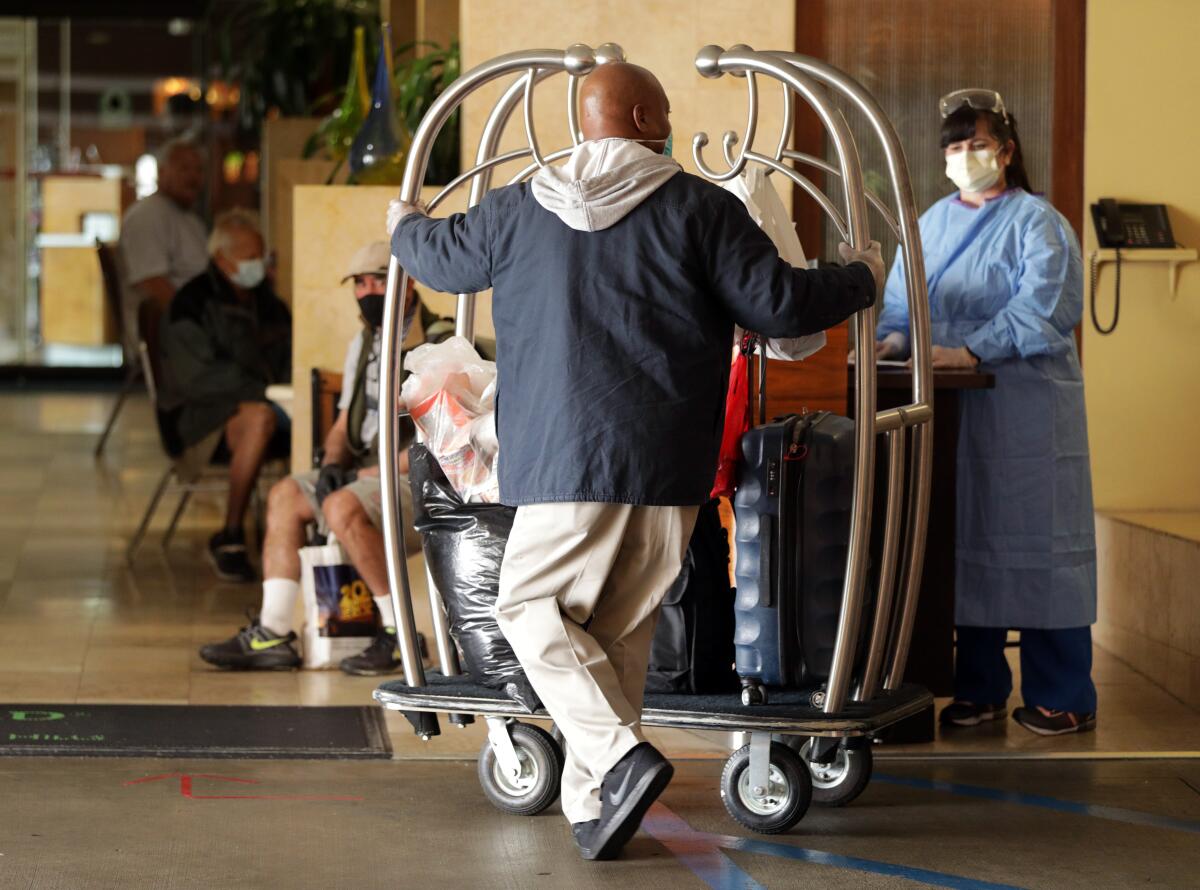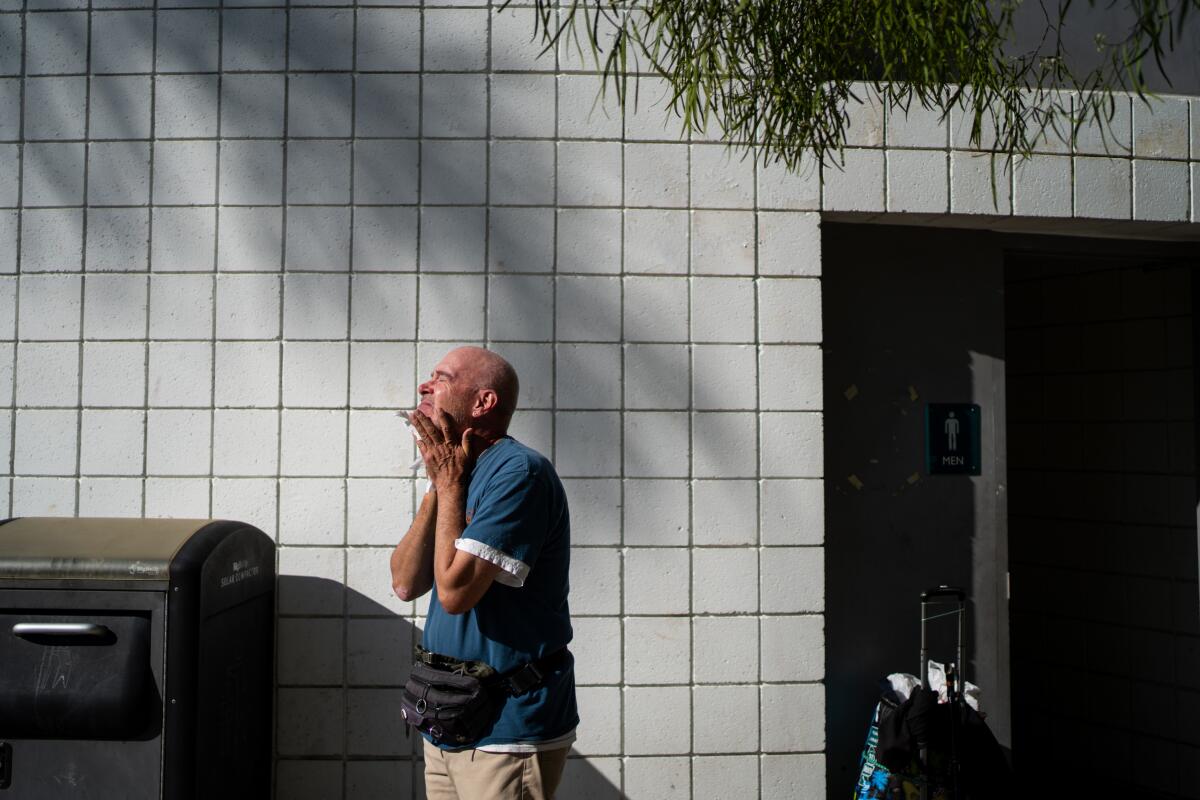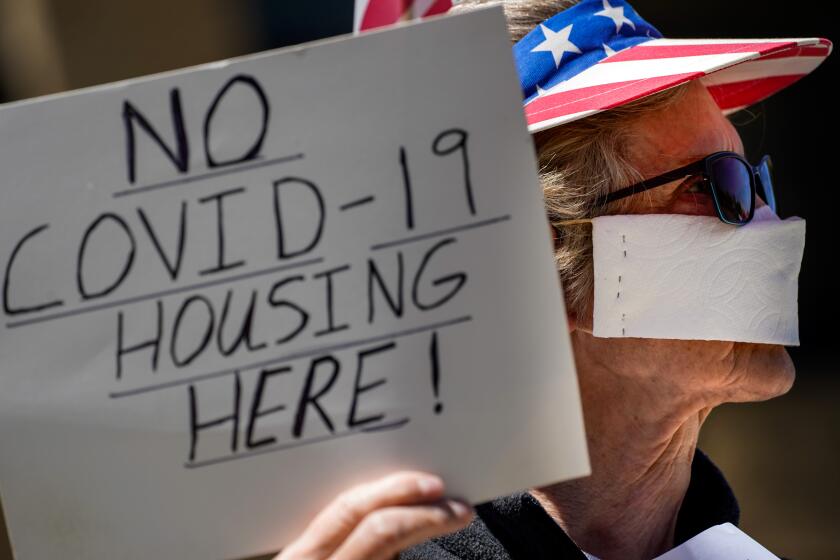‘Tell the hotels they are commandeered.’ Homeless activists are losing patience with L.A.

Not long after L.A. County reported more than 1,000 new coronavirus cases on Friday, Davon Brown decided he was done putting himself at risk. So he put on a blazer and went to the Ritz-Carlton Los Angeles.
Joined by activists from Street Watch L.A., he told hotel staff they were interested in renting several rooms but wanted a tour first. The concierge happily obliged, he said, and took the group to room 2221.
Then he revealed his plan: “I’m homeless in Echo Park and I’m not leaving this hotel.”
Brown, who was later arrested and released, told The Times that he had planned to stay until government officials had commandeered enough hotel rooms to house every homeless person in Los Angeles.
“If I stayed outside,” he said, “I could die.”
The protest — the latest of several increasingly defiant demonstrations over housing and rent during the pandemic — comes as homeless activists have stepped up their calls for Mayor Eric Garcetti and the county Board of Supervisors to use their emergency powers to seize hotels and motels that are all but empty because of fears over the novel coronavirus.
“If you can tell the entire city of Los Angeles that we can shelter in place, then you can tell the hotels they are commandeered and they need to open their doors to the residents of skid row,” said Legal Aid Foundation of Los Angeles attorney Shayla Myers, during a recent federal court hearing in a lawsuit on homelessness.
With about 60,000 homeless residents, Los Angeles County is falling behind on its previously stated goal of moving a portion of them -- 15,000 -- into hotel rooms. It had only about 2,200 rooms leased as of late last week.
On Friday, county officials said they had signed leases for an additional 507 rooms, and on Monday, Garcetti announced that a downtown hotel with 460 rooms also had been leased. But even with nearly 1,000 additional rooms under lease, the county is still not on pace to reach 15,000 rooms until the end of August, a Times analysis found.
L.A. County, participating in an ambitious statewide effort known as Project Roomkey, got off to a quick start by leasing nearly 2,000 rooms in the first two weeks of April. Progress has been slow since then, though. Of the 700 rooms that had been leased through the end of last month, 500 were removed from the program over issues with insurance and contract terms.
Despite the discouraging numbers, county officials say they are conducting complicated negotiations at an accelerated pace, with staffers of the Los Angeles Homeless Services Authority filling rooms only a few days after they become available. On Monday, county officials reported that about 1,500 of the rooms under lease were occupied.
But negotiating with hotel owners is still preferable to the more confrontational approach of seizing hotels that is favored by some activists, they added.

Such powers, while rarely used, can be wielded during wildfires, with government agencies taking private land to build a fire break, for example. In the case of the COVID-19 pandemic, lawyers from the county, city and state looked at whether commandeering hotels for a short time would be legal as well and determined that it would be.
“Commandeering is very seldom used by government,” said David Howard, an assistant county executive officer who heads the negotiating team. “It’s only done in the event of disaster.”
Coronavirus: L.A. launches new effort to move 15,000 people out of overcrowded shelters and encampments and into hotel rooms.
Still, some legal experts say a move to seize hotels could actually add to the time it takes to secure rooms. Forcing a hotel owner to lease rooms to a third party would trigger state and federal eminent domain laws, said attorney Christopher Sutton.
To comply with the law, a government agency would need to allow an unwilling hotel owner to make their case during a public hearing. Any unresolved dispute over price would ultimately wind up in the courts, said Sutton, who represents property owners and businesses in such cases.
In the best-case scenario, it would take 60 to 90 days for a government agency to take control of a hotel, Sutton said. However, a more typical timeline would be 150 days, he said.
“The government can’t simply willy-nilly seize personal property without the consent of a judge with a value set by a jury,” he said. “So as a practical matter, it’s going to be easier to do a negotiated deal. You’ll be able to claim success more quickly.”
County Supervisor Kathryn Barger said officials should instead focus on helping owners become comfortable with housing homeless people.
“We need to be more aggressive,” she said. “But we also need to recognize that we still live in a country where you’ve got the ability to say ‘I refuse.’”
Despite the problems, officials are not backing off the plan to fill 15,000 rooms — a number that reflects the estimated number of homeless people in L.A. County who are 65 or older or who have health conditions that make them susceptible to dying of COVID-19.
“We know it’s what the need is,” said Heidi Marston, interim executive director of the Los Angeles Homeless Services Authority, which is responsible for operating the hotels once they’re leased. “And that need is not going to change and, in fact, it could potentially grow.”
But some politicians say the city and county are missing a prime opportunity to quickly move thousands off the street and into safe spaces.
Councilman Mike Bonin said hotels are far superior to the recreation centers the city has converted into congregant shelters — both for those who move in and for those assigned to work there. There have been a string of coronavirus cases in shelters on skid row, particularly Union Rescue Mission, and a few cases in the city’s recreation centers.

The fact that the city and county haven’t made more progress is “really frustrating and dispiriting,” Bonin said.
Bonin said he has received conflicting information about why so few hotels have opened their doors. But the slow pace has resulted in a backlog of homeless people waiting to be placed in hotels.
Terrance Whitten, a 67-year-old homeless man with intestinal bleeding, received a text from his case worker on April 23 telling him he was on the queue for a hotel room. In the more than a week of waiting, he said, it’s been “profound silence.” Each day, he waits under a tree in Pan Pacific Park, then catches a bus to an undisclosed place where he sleeps in his unit.
Some blame government bureaucracy, while others have said L.A. hotel operators have expressed interest, only to have the idea vetoed by their corporate owners, shareholders or lawyers. Barger has attributed it to political opposition from some suburban communities.
“If hotels being unwilling [to participate] are the holdup, then yes, I think commandeering is something we need to do,” Bonin said. “We need to be moving before the damn crisis is over. But right now, I don’t know for sure that the hotels are the holdup.”
As California begins to ease stay-at-home orders and businesses resume operating, it may become more difficult for the county to persuade hotel operators to enter into 90-day leases. Still, one official said some owners who were initially resistant to the program are now calculating that some revenue is better than none, given the economic uncertainty of the coming months.
Currently, the the vast majority of Los Angeles hotel stock is idle. Only 30% of hotels in the Los Angeles and Long Beach market were occupied as of late April, according to STR Global, a company that tracks hotel data. That’s a 64% drop from the same week a year ago.
Hotel owners and their representatives who spoke with The Times have said that Project Roomkey has been a valuable financial lifeline. And some have said the county has been slow to acknowledge their offers for leases.
After initially working with owners of small hotels, county officials are now trying to land larger properties, including more downtown closer to skid row, such as the one Garcetti announced on Monday. Locking down rooms in that part of the county had proved more difficult.
These additional rooms “will completely change the shape of the curve,” said Phil Ansell, director of the county’s Homeless Initiative.
Lodging protests or threatening to sue hotel owners, some California cities and residents fight plans to house homeless people during the pandemic.
Appearing in federal court last month, Myers said homeless people should be moved into downtown hotels, particularly those that have benefited from generous taxpayer subsidies.
According to a report prepared in 2018 by City Controller Ron Galperin, four hotel projects with a combined 2,633 rooms have opened with the city’s financial support over the past decade.
The 1,001-room L.A. Live complex, which houses a J.W. Marriott and a Ritz-Carlton, received an agreement for up to $270 million in taxpayer aid over a 25-year period. The 889-room InterContinental Los Angeles Downtown Hotel, located in the Wilshire Grand tower, is slated to receive $250 million in public assistance over 25 years, the report said.
Two smaller properties — Hotel Indigo next to the 110 Freeway, and a Marriott complex on Olympic Boulevard — have deals to receive a combined $86 million in subsidies over the life of their agreements with the city, Galperin found.
Bonin wants the city’s policy analysts to determine whether any of those hotels are housing homeless residents — and if not, why not.
Representatives of the hotels at L.A. Live did not answer questions from The Times. But a spokesperson for the Hotel Indigo said operators of that facility had “fully evaluated every request” and that “most of the guests currently at the hotel are front line caregivers.”
Garcetti on Friday said that officials reached out to hundreds of hotels, including those that have received taxpayer support.
“I hope that [hotel owners] will do it for their bottom line, and that they will also do it because it’s the right thing to do,” he said.
More to Read
Sign up for Essential California
The most important California stories and recommendations in your inbox every morning.
You may occasionally receive promotional content from the Los Angeles Times.











